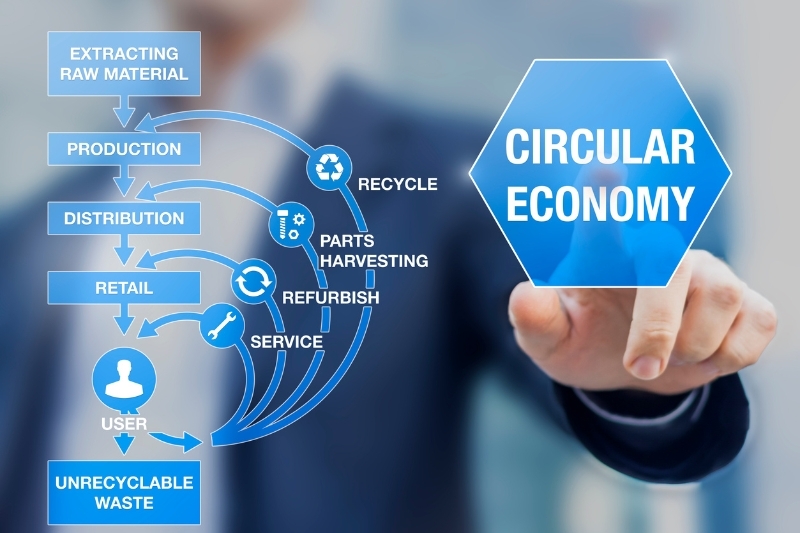In the face of growing environmental concerns and the need for more sustainable practices, the UK automotive industry is undergoing a transformative shift towards a circular economy. This revolutionary approach aims to redefine the traditional linear “take-make-waste” model, instead embracing a closed-loop system where resources are continuously reused, recycled, and repurposed.
As we navigate this pivotal moment, it is essential to understand the profound impact the circular economy can have on the UK’s automotive sector. By embracing sustainable practices, manufacturers, suppliers, and consumers can collectively contribute to a more environmentally-conscious future, one that prioritizes resource efficiency, waste reduction, and the preservation of our planet’s finite resources.
Understanding the concept of sustainability in the automotive sector
Sustainability in the automotive industry encompasses a multifaceted approach that addresses environmental, social, and economic considerations. At its core, sustainability aims to ensure that the development, production, and use of vehicles minimise their ecological footprint, while also fostering long-term economic viability and social responsibility.
This holistic perspective encompasses a wide range of factors, including:
- Environmental impact: Reducing greenhouse gas emissions, optimising energy efficiency, minimising waste, and promoting the use of renewable and recyclable materials.
- Resource management: Implementing circular economy principles to maximise the lifespan and reusability of vehicle components and materials.
- Social responsibility: Ensuring fair labour practices, promoting diversity and inclusion, and enhancing the overall well-being of communities affected by the automotive industry.
- Economic sustainability: Maintaining profitability, fostering innovation, and creating new business opportunities that align with sustainable development.
By embracing sustainability as a core tenet, the UK automotive industry can pave the way for a more resilient and future-proof sector, one that meets the evolving needs of consumers and the planet.
Benefits of adopting a circular economy approach in the automotive industry
The transition to a circular economy in the UK automotive industry presents a wealth of benefits, both for businesses and the environment. Some of the key advantages include:
- Resource efficiency: By reusing, remanufacturing, and recycling vehicle components and materials, the industry can reduce its reliance on virgin raw materials, leading to significant cost savings and a lower environmental impact.
- Waste reduction: The circular economy model aims to eliminate waste throughout the entire product lifecycle, from design and manufacturing to end-of-life management, thereby minimising the amount of waste sent to landfills or incineration.
- Innovation and competitiveness: Embracing circular economy principles encourages the development of new technologies, business models, and collaborative partnerships, enhancing the UK automotive industry’s competitiveness in the global market.
- Regulatory compliance: As governments worldwide implement stricter environmental regulations, the circular economy approach helps automotive companies stay ahead of the curve and ensure compliance with evolving sustainability standards.
- Brand reputation and customer trust: Demonstrating a commitment to sustainability and responsible practices can strengthen brand image, foster customer loyalty, and position the UK automotive industry as a leader in environmental stewardship.
- Job creation and economic growth: The circular economy can stimulate the development of new industries, services, and job opportunities, contributing to the overall economic prosperity of the UK.
By embracing these benefits, the UK automotive industry can drive the circular economy revolution, paving the way for a more sustainable and resilient future.
The role of government and regulations in driving sustainability in the UK automotive industry
The UK government plays a crucial role in accelerating the transition to a circular economy within the automotive industry. Through the implementation of strategic policies, targeted regulations, and incentive schemes, the government can create a supportive ecosystem that encourages sustainable practices and fosters innovation.
Some of the key government initiatives and regulations that are shaping the circular economy revolution in the UK automotive industry include:
- Extended Producer Responsibility (EPR) schemes: EPR policies hold manufacturers responsible for the end-of-life management of their products, incentivising them to design for disassembly, reuse, and recyclability.
- Emissions reduction targets: The UK’s legally binding commitment to achieve net-zero greenhouse gas emissions by 2050 has spurred the automotive industry to invest in the development of low-emission and electric vehicles.
- Recycling and waste management regulations: Stringent regulations on waste disposal and recycling rates compel automotive companies to implement comprehensive waste management strategies and explore innovative recycling solutions.
- Incentives and funding programs: Government-backed financial incentives, such as tax credits, grants, and investment funds, support the development and implementation of circular economy initiatives within the automotive sector.
- Collaboration and knowledge-sharing platforms: The government facilitates industry-wide collaboration, knowledge exchange, and the dissemination of best practices to accelerate the adoption of circular economy principles.
By actively shaping the policy and regulatory landscape, the UK government can create a conducive environment for the automotive industry to embrace the circular economy, driving sustainable transformation and positioning the country as a global leader in this field.
Case studies of UK automotive companies implementing circular economy practices
The UK automotive industry is home to numerous pioneering companies that have successfully implemented circular economy practices, serving as inspiring examples for the rest of the sector.
Case Study 1: Jaguar Land Rover’s Closed-Loop Aluminium Recycling Jaguar Land Rover, a renowned British automotive manufacturer, has implemented a groundbreaking closed-loop aluminium recycling system. The company collects and recycles aluminium from its production facilities and end-of-life vehicles, reintroducing the material back into the manufacturing process. This approach has enabled Jaguar Land Rover to reduce its carbon footprint, conserve natural resources, and establish a more sustainable supply chain.
Case Study 2: Vauxhall’s Remanufacturing Program Vauxhall, a leading UK automotive brand, has embraced the principles of remanufacturing to extend the lifespan of its vehicle components. The company operates a dedicated remanufacturing facility that refurbishes and restores a wide range of parts, from engines and transmissions to electronics and steering systems. By offering remanufactured components, Vauxhall can reduce waste, conserve resources, and provide more affordable options for its customers.
Case Study 3: Bentley’s Circular Furniture Initiative Bentley, the luxury automotive brand, has taken a unique approach to the circular economy by repurposing leather offcuts from its vehicle production into high-quality furniture. The company has partnered with local designers and craftspeople to create a range of sustainable furniture pieces, demonstrating the versatility of automotive materials and the potential for innovative circular solutions.
These case studies showcase the diverse ways in which UK automotive companies are embracing the circular economy, from closed-loop recycling and remanufacturing to the innovative repurposing of materials. By sharing these success stories, the industry can inspire others to follow suit and accelerate the transition towards a more sustainable future.
Challenges and barriers to implementing circular economy principles in the automotive sector
Despite the compelling benefits of the circular economy, the UK automotive industry faces several challenges and barriers in its implementation. Understanding and addressing these obstacles is crucial for driving sustainable transformation effectively.
- Complex supply chains and product design: The automotive industry’s intricate supply chains and the inherent complexity of vehicle design can make it challenging to implement circular economy principles, such as modular design and easy disassembly.
- Lack of infrastructure and technological limitations: The availability of robust infrastructure for collection, sorting, and recycling of vehicle components and materials is often insufficient, hindering the scalability of circular economy initiatives.
- Regulatory and policy gaps: While the UK government has taken steps to promote sustainability, there may be gaps or inconsistencies in the regulatory framework that can slow down the adoption of circular economy practices.
- Consumer awareness and behaviour: Changing consumer perceptions and behaviours to embrace the circular economy model, such as increased acceptance of remanufactured or refurbished parts, can be a significant challenge.
- Financial and economic barriers: The initial investment required to transition to a circular economy model, as well as the potential disruption to existing business models, can pose financial and economic hurdles for automotive companies.
- Collaboration and coordination across the value chain: Effective implementation of the circular economy requires seamless collaboration and coordination among various stakeholders, including manufacturers, suppliers, recyclers, and policymakers, which can be complex to achieve.
By acknowledging these challenges and proactively addressing them through innovative solutions, strategic partnerships, and policy interventions, the UK automotive industry can overcome the barriers and accelerate the transition towards a more sustainable, circular future.
Innovations and technologies shaping the circular economy revolution in the UK automotive industry
The circular economy revolution in the UK automotive industry is being driven by a wave of innovative technologies and cutting-edge solutions. These advancements are enabling automotive companies to rethink their production processes, product design, and end-of-life management, paving the way for a more sustainable and resource-efficient future.
- Advanced materials and alternative fuel technologies: The development of lightweight, recyclable, and biodegradable materials, as well as the adoption of alternative fuel sources like electric, hydrogen, and biofuels, are reducing the environmental impact of vehicles.
- Modular and design-for-disassembly approaches: Innovative vehicle design strategies that prioritise modularity, repairability, and easy disassembly are facilitating the reuse, remanufacturing, and recycling of vehicle components.
- Artificial Intelligence (AI) and data analytics: AI-powered systems and data analytics are enabling more efficient resource management, predictive maintenance, and optimised logistics, improving the overall circularity of the automotive value chain.
- Additive manufacturing (3D printing): The use of 3D printing technology is enabling on-demand production of spare parts, reducing the need for inventory and minimising waste associated with traditional manufacturing methods.
- Closed-loop recycling and material recovery: Advancements in recycling technologies, such as chemical recycling and advanced sorting techniques, are enhancing the recovery and reintroduction of materials back into the production process.
- Digital platforms and traceability solutions: Innovative digital platforms and blockchain-based traceability systems are improving transparency, enabling the tracking of materials and components throughout the entire lifecycle.
These technological advancements, combined with a collaborative and innovative mindset, are empowering the UK automotive industry to embrace the circular economy and drive sustainable transformation.
Collaboration and partnerships driving sustainability in the UK automotive industry
The transition to a circular economy in the UK automotive industry requires a collaborative and cross-sectoral approach. By fostering strategic partnerships and engaging with various stakeholders, automotive companies can leverage collective expertise, resources, and innovative solutions to accelerate the adoption of sustainable practices.
- Industry collaborations: Automotive manufacturers, suppliers, and service providers are forming industry-wide collaborations to share best practices, develop common standards, and explore joint circular economy initiatives.
- Academic and research partnerships: Collaborations with universities, research institutes, and innovation hubs are enabling the automotive industry to access cutting-edge research, technology, and expertise to address circular economy challenges.
- Government-industry partnerships: Partnerships between the automotive industry and government agencies are crucial for aligning policies, regulations, and incentive schemes to create a supportive ecosystem for the circular economy.
- Cross-industry collaborations: Automotive companies are engaging with other industries, such as electronics, plastics, and construction, to explore synergies and develop innovative solutions for the reuse, repurposing, and recycling of materials.
- Supplier and customer engagement: Automotive companies are working closely with their suppliers and customers to ensure the seamless integration of circular economy principles throughout the value chain, from product design to end-of-life management.
- Circular economy hubs and networks: The establishment of dedicated circular economy hubs, networks, and knowledge-sharing platforms is facilitating the exchange of ideas, fostering collaboration, and accelerating the implementation of sustainable practices across the UK automotive industry.
By fostering these diverse partnerships and collaborations, the UK automotive industry can leverage collective expertise, pool resources, and drive the circular economy revolution, positioning the country as a global leader in sustainable automotive solutions.
Future trends and opportunities in the circular economy revolution in the UK automotive industry
As the circular economy revolution gains momentum, the UK automotive industry is poised to embrace a future filled with innovative solutions, emerging trends, and exciting opportunities. By staying ahead of the curve, automotive companies can position themselves for long-term success and contribute to a more sustainable future.
- Increased adoption of electric and alternative fuel vehicles: The growing demand for electric, hybrid, and hydrogen-powered vehicles will drive the need for sustainable battery management, recycling, and the development of closed-loop supply chains.
- Advanced material recycling and recovery: Breakthroughs in chemical recycling, material sorting, and purification technologies will enable the automotive industry to recover and reintroduce a wider range of materials, including plastics and composites, back into the production process.
- Digitalization and the rise of the “smart” circular economy: The integration of digital technologies, such as the Internet of Things (IoT), artificial intelligence, and blockchain, will enhance traceability, predictive maintenance, and the optimization of circular economy processes.
- Servitization and product-service systems: The automotive industry will likely see a shift towards service-based business models, where manufacturers offer mobility solutions and maintain ownership of vehicles, enabling better resource management and end-of-life planning.
- Circular design and modular vehicle architectures: Vehicle design will increasingly prioritize circularity, with a focus on modularity, repairability, and easy disassembly to facilitate reuse, remanufacturing, and recycling.
- Collaboration and cross-industry synergies: The automotive industry will deepen its partnerships with other sectors, such as electronics, construction, and the sharing economy, to create synergies and develop holistic circular economy solutions.
- Regulatory and policy advancements: Governments will continue to strengthen policies, regulations, and incentive schemes to drive the adoption of circular economy practices, creating a supportive environment for the automotive industry’s sustainable transformation.
By embracing these emerging trends and seizing the opportunities presented by the circular economy revolution, the UK automotive industry can secure a prosperous and sustainable future, leading the way towards a more resource-efficient and environmentally-conscious transportation landscape.
Conclusion: Embracing the circular economy for a sustainable future in the UK automotive sector
The circular economy revolution in the UK automotive industry represents a pivotal moment in our collective journey towards a more sustainable future. By redefining the traditional linear model and embracing a closed-loop system, automotive companies can unlock a wealth of benefits, from resource efficiency and waste reduction to enhanced competitiveness and brand reputation.
Through innovative technologies, strategic collaborations, and proactive policy interventions, the UK automotive industry is poised to lead the way in the circular economy revolution. By overcoming the challenges and barriers, automotive companies can drive sustainable transformation, positioning the UK as a global leader in the transition towards a more circular and environmentally-conscious transportation landscape.





